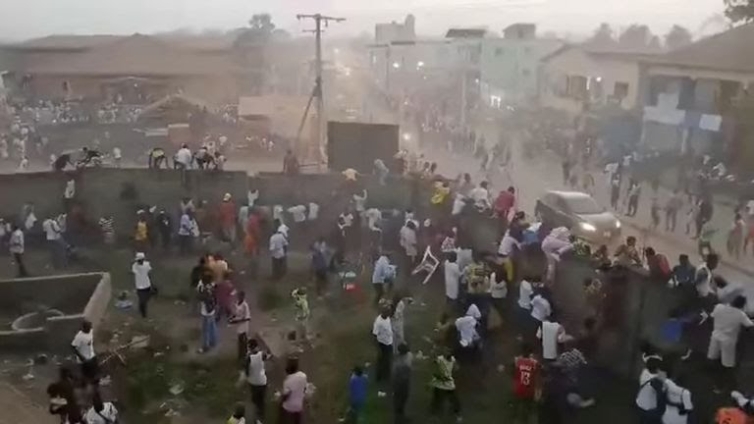Nzerekore Stadium Tragedy: Human Rights Group Reports 135 Dead Amidst Official Silence
Thursday, 05 December 2024 | Africa

A horrific tragedy unfolded on Sunday in Nzerekore, southeast Guinea, as a deadly stadium crush during a soccer match claimed numerous lives. While the government has confirmed 56 fatalities, local human rights organizations report a far grimmer toll of 135 deaths, mostly children under 18. Over 50 people remain missing, heightening the community's anguish.
The chaos erupted after a controversial refereeing decision during the match sparked unrest among spectators. Police responded with tear gas, leading to panic and a frantic stampede toward exits. Witness accounts reveal harrowing scenes as people struggled to escape the overcrowded venue, with many trampled in the process.
The Nzerekore regional human rights collective attributed the higher death toll to information gathered from hospitals, cemeteries, victim families, and local media outlets. They strongly criticized the security forces for excessive use of tear gas and for prioritizing the safety of officials over the panicked spectators. Reports also indicate that vehicles carrying officials out of the stadium struck fleeing attendees, further exacerbating the chaos.
A statement from the collective emphasized that the overcrowded stadium’s gates were blocked by security personnel, worsening the stampede. The group placed blame on the tournament organizers and Guinea’s ruling junta, which provided both technical and financial support for the event held in honor of military leader Mamady Doumbouya.
“This tragedy could have been prevented,” the group declared, highlighting that poor crowd management and security failures created the conditions for the disaster.
The government has yet to address these accusations, though on Monday it announced plans to investigate the incident. Families and civil society groups are pressing for accountability, urging the government to provide clarity and justice for the victims.
The Nzerekore tragedy is a painful reminder of the importance of crowd safety at public events. As Guinea mourns this devastating loss, many hope the promised investigation will not only bring justice but also result in reforms to prevent such a catastrophe in the future.
The chaos erupted after a controversial refereeing decision during the match sparked unrest among spectators. Police responded with tear gas, leading to panic and a frantic stampede toward exits. Witness accounts reveal harrowing scenes as people struggled to escape the overcrowded venue, with many trampled in the process.
The Nzerekore regional human rights collective attributed the higher death toll to information gathered from hospitals, cemeteries, victim families, and local media outlets. They strongly criticized the security forces for excessive use of tear gas and for prioritizing the safety of officials over the panicked spectators. Reports also indicate that vehicles carrying officials out of the stadium struck fleeing attendees, further exacerbating the chaos.
A statement from the collective emphasized that the overcrowded stadium’s gates were blocked by security personnel, worsening the stampede. The group placed blame on the tournament organizers and Guinea’s ruling junta, which provided both technical and financial support for the event held in honor of military leader Mamady Doumbouya.
“This tragedy could have been prevented,” the group declared, highlighting that poor crowd management and security failures created the conditions for the disaster.
The government has yet to address these accusations, though on Monday it announced plans to investigate the incident. Families and civil society groups are pressing for accountability, urging the government to provide clarity and justice for the victims.
The Nzerekore tragedy is a painful reminder of the importance of crowd safety at public events. As Guinea mourns this devastating loss, many hope the promised investigation will not only bring justice but also result in reforms to prevent such a catastrophe in the future.


 How to resolve AdBlock issue?
How to resolve AdBlock issue?